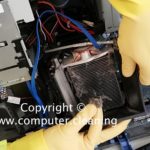A Computer Repair Technician is a specialist position, they usually work in the operations department to carry out computer hardware & software repair and maintenance tasks such as keyboards, monitors, disk drives, etc. The repair technician follows the computer manufacturers’ guidelines for warranty reimbursement.
General Responsibilities of a Computer Repair Technician
- Repair technician operates a work-order tracking system (Help-Desk) to receive and clear daily work requests.
- Reviews repair requests, determines the extent of needed service and exercises considerable judgment in continuing with the service or forwarding extensive requests to supervisor.
- A repair technician uses special testing devices, schematic diagrams, factory maintenance documentation or system defined tests to locate malfunctions in electronic devices such as PC personal computers, monitors, keyboards, disk drives, telephones, and printers.
- Uses specific manufacturer’s documentation to determine malfunctions and repair computer components according to manufacturer’s guidelines for warranty reimbursement.
- Determines the cause of an error and applies corrective action to correct problems and repair computer equipment.
- Assembles computer-related equipment according to schematic diagrams and written instructions.
- Installs, replaces and repairs electronic components of computer equipment.
- Modifies and upgrades units as outlined by supervisor such as installing additional memory and adding drives.
- Monitors performance of equipment and makes necessary adjustments to assure quality performance.
IT and Computer Repair Training and Certifications
In broad-spectrum, there is a variety of training and certifications programs for IT and computer repair technicians but mostly MCSA 2012, CompTIA N+, and Windows certifications are considered enough for a starter.
Computer & General Knowledge
Physical Requirements
Must be physically able to operate a variety of equipment and tools including computers, scanners, computer software, computer hardware, etc. Must be able to exert up to 30 pounds of force occasionally and/or up to 5 pounds of force frequently, and/or a negligible amount of force constantly to move objects.
Data Conception
Requires the ability to compare and/or judge the readily observable, functional, structural or composite characteristics (whether similar or divergent from obvious standards) of data, people or things.
Interpersonal Communication
Requires the ability to speak and/or signal people to convey or exchange information. Includes receiving instructions, assignments or directions from superiors.
Language Ability
Requires the ability to read a variety of correspondence, technical manuals, trade journals, etc. Requires the ability to prepare reports, forms, system documentation, etc. using prescribed formats and conforming to all rules of punctuation, grammar, diction, and style. Requires the ability to speak to people with poise, voice control and confidence.
Intelligence
Requires the ability to apply rational systems to solve practical problems and deal with a variety of concrete variables in situations where only limited standardization exists; to interpret a variety of instructions furnished in written, oral, diagrammatic, or schedule form.
Verbal Aptitude
Requires the ability to record and deliver information, to explain procedures, to give oral and written instructions. Must be able to communicate effectively and efficiently in a variety of technical or professional languages including computer terminology.
Numerical Aptitude
Requires the ability to utilize mathematical formulas; to add and subtract; multiply and divide; utilize decimals and percentages.
Form/Spatial Aptitude
Requires the ability to inspect items for proper length, width and shape.
Motor Coordination
Requires the ability coordinate hands and eyes rapidly and accurately in using computer equipment.
Manual Dexterity
Requires the ability to handle a variety of items such as computer equipment. Must have minimal levels of eye/hand/foot coordination.
Colour Discrimination
Requires the ability to differentiate between colours and shades of colour.
Interpersonal Temperament
Requires the ability to deal with people beyond giving and receiving instructions. Must be adaptable to performing under stress and when confronted with persons acting under stress.
Physical Communication
Requires the ability to talk and hear: (Talking: expressing or exchanging ideas by means of spoken words. Hearing: perceiving nature of sounds by ear.) Must be able to communicate via telephone.
Computer and Technical Knowledge
- Working knowledge of design, assembly, and operation of personal computers and other electronic devices.
- Working knowledge of electronic principles.
- Working knowledge of diagnostic tools and utilities.
- Considerable knowledge of the use and operation of standard electronic testing equipment.
- Considerable knowledge of computer hardware and common software applications.
- Some knowledge of the current literature, trends and developments in the field of technology.
- Ability to read and interpret schematic diagrams and maintenance documentation.
- Ability to systematically determine the source of problems in electronic devices and take appropriate action.
- Ability to perform initial installations or upgrades of computer hardware.
- Ability to review and evaluate computer hardware and make recommendations for improvement.
- Ability to respond to questions and make judgments based on knowledge of computer equipment.
- Ability to prepare and process documents such as purchase orders, etc.
- Ability to maintain complete and accurate records.
- Ability to establish and maintain effective working relationships as necessitated by work assignments.





